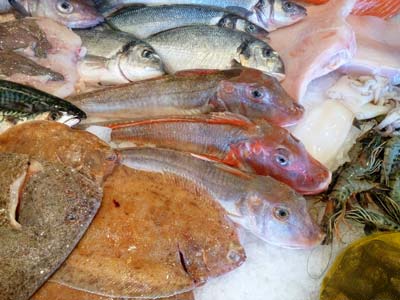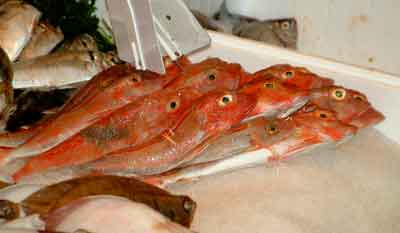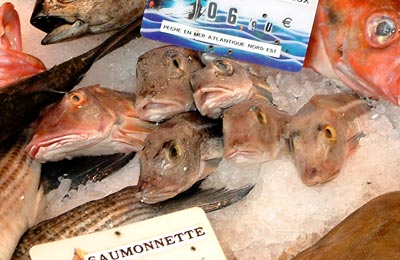
Gurnard. Gurnards are strange-looking, scaly, bottom-feeding fish with spikes which use the three bottom rays of their pectoral fins to "feel" the sea bed. They have firm-textured white meat with not much flavour, and are rich in protein, iodine and phosphorus. They emit a strange grunting noise and some make good eating. The grey gurnard (Eutrigla gurnardus) has a brownish-grey back and silver belly. The red gurnard (Aspitrigla cuculus) is the most attractive member of the family with pinkish-red colour and the finest flavour of the gurnards. The tub gurnard (Trigla lucerna) is a large brownish-orange variety with bright orange pectoral fins and is the one most readily available in the United Kingdom. There is a variety known as flying gurnard as it is a fine swimmer which sometimes leaps out of the water. They are all very bony fish. Small ones are excellent in soup. Red or grey mullet (US: striped mullet) can generally be subsituted for it, and are usually better. Also a Sicilian name for a dolphin fish.
Strips of gurnard cooked with aubergines (US: eggplants), olives, capers and vegetables in season in a rich stew, sometimes with anchovies.

Red gurnard. Gurnards are strange-looking, scaly, spiky, bottom-feeding fish which use the three bottom rays of their pectoral fins to "feel" the sea bed. They have firm-textured white meat with a mild flavour. They are rich in protein, iodine and phosphorus. The red gurnard is the most attractive member of the family with pinkish-red colour and the finest flavour of the gurnards. They are all bony and tend to dryness so they are best served with a sauce. Small ones are excellent in soup. Red or grey mullet (US: striped mullet) can generally be subsituted for it, and are usually better.

Tub gurnard. Gurnards are strange-looking, bottom-feeding fish which use the three bottom rays of their pectoral fins to "feel" the sea bed. They have firm-textured white meat with not much flavour. They are rich in protein, iodine and phosphorus. The tub gurnard is a large brownish-orange variety with bright orange pectoral fins and is the one most readily available in the United Kingdom. They are all very bony fish. Small ones are excellent in soup. Red or grey mullet (US: striped mullet) can generally be substituted for it, and are usually better.

Gurnard. Gurnards are strange-looking, scaly, bottom-feeding fish with spikes which use the three bottom rays of their pectoral fins to "feel" the sea bed. They have firm-textured white meat with not much flavour, and are rich in protein, iodine and phosphorus. They emit a strange grunting noise and some make good eating. The grey gurnard (Eutrigla gurnardus) has a brownish-grey back and silver belly. The red gurnard (Aspitrigla cuculus) is the most attractive member of the family with pinkish-red colour and the finest flavour of the gurnards. The tub gurnard (Trigla lucerna) is a large brownish-orange variety with bright orange pectoral fins and is the one most readily available in the United Kingdom. There is a variety known as flying gurnard as it is a fine swimmer which sometimes leaps out of the water. They are all very bony fish. Small ones are excellent in soup. Red or grey mullet (US: striped mullet) can generally be subsituted for it, and are usually better.
Piper. A fish of the gurnard family which has a white belly and red back and is larger than most of the gurnards.
A dialect name for the black boletus mushroom. Excellent to eat from August to October whether raw in salads or cooked or preserved and also freezes well.
"Castrated." A version of caponata from Piedmont. Caponata is a Sicilian dish of aubergines (US: eggplants), olives, tomatoes and other ripe vegetables in a rich stew with wine vinegar and sugar, sometimes with anchovies and capers, pine nuts, celery or sultanas even with bottarga. In fact, it is usually described as a vegetarian dish. It is piled into a dome and usually served cold. It may be served on its own or as a side dish, or even as a sauce to accompany pasta. Caponèt more commonly describes stuffed courgette (US: zucchini) flowers.